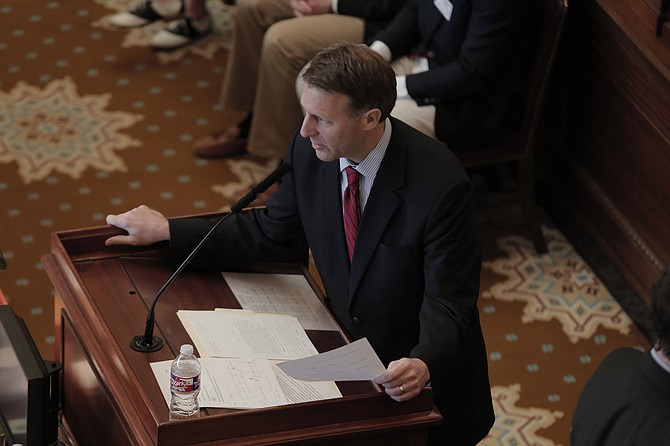Sen. Gray Tollison, R-Oxford, brought out an education "dummy" bill in his Education Committee on Jan. 31 that would enable lawmakers to implement some of EdBuild's recommendations into law this session. Photo by Imani Khayyam.
JACKSON — Mississippi's education-funding formula could change any time until Feb. 9 after the House Appropriations and Senate Education committees moved forward dummy bills Tuesday on deadline day this week, keeping them alive to revisit and alter later.
Democrats, who held their own education-funding hearing on Jan. 27, vocalized their concerns with the fast pace of the Legislature's consideration of a new formula developed behind closed doors.
"(Let's) stop the train right now, let's think about this, let's take our time and ... in the meantime, let's fully fund education in Mississippi," House Minority Leader David Baria, D-Bay St. Louis, said at a press conference Jan. 27.
Days later on Jan. 31, Rep. Richard Bennett, R-Long Beach, took up and explained House Bill 1294 to the House Appropriations Committee, which brings forward 370 pages of code sections for the possible purpose of revising the state's education-funding formula. Bennett asked members to allow the bill to go through the process so lawmakers could work to make changes.
"We don't have to pass it this session, but we've got to do something," Bennett told the House Appropriations Committee Jan. 31. "This is not a partisan issue; it can't be a partisan issue."
Rep. Steve Holland, D-Plantersville, tried to amend the bill in committee to make it effective in 2018—not 2017 like the bill says, but his amendment failed.
"Do you feel like we have to rush something out this session, or could this wait and could we all study this a little bit better before we jump off that cliff?" Rep. David Baria, D-Bay St. Louis, asked Bennett.
Bennett said he got the EdBuild recommendations the same day all the other members did and repeated that if lawmakers cannot get changes through this session, he was not opposed to waiting.
Average daily membership, revising the state's definition for low-income students, and implementing EdBuild's recommendations in regards to transparency and reporting measures for school districts all came up as possible options for reform throughout the House Appropriations meeting.
Bennett said lawmakers should know what they're voting on as the process goes on that. Specific numbers or suggested weights are still missing in the bills and from the conversation, however, and Bennett said they would take up some recommendations from EdBuild but likely not all of them.
"I think it's a misnomer out there to say some districts are going to lose a lot of money because I think that's real premature to say—we just don't know yet," Bennett told reporters after the meeting.
At the other end of the Capitol, Sen. Gray Tollison, R-Oxford, brought out a similar bill to amend the state's education-funding formula, which requires school districts and the Mississippi Department of Education to report vital statistics and fiscal breakdowns of budgets. Tollison's bill also brings forward code sections dealing with the Mississippi Adequate Education Program, but it's only a 124-page bill.
Presenting the bill on deadline day, Tollison emphasized the accountability measures in the bill, without mentioning any changes to the formula. Sen. David Blount, D-Jackson, spoke against the bill.
"This is a 'dummy bill'; look at the short title. This is the vehicle to scrap the funding formula ... these are the folks that say MAEP is too complicated," Blount said. "This bill will determine more than $2 billion in state funding, and you don't know what it's going to cost ... how is this going to affect local school funding?"
Blount said that while EdBuild's proposal contains good points, he wanted to know how the proposal would affect his local district and taxpayers.
Tollison said he was looking at several of EdBuild's recommendations going forward, including rolling some of the additional funds in the Mississippi Adequate Education Program add-on program costs that now pay for special education, transportation and vocational education among other things into the general formula calculation.
The Senate Education Committee chairman noted that a phase-in of five to eight years is likely, and told reporters on Jan. 31 that he is looking at some but not all of the EdBuild recommendations as a blueprint. When asked who was working on the recommendations, Tollison made it clear that the effort is among top leadership.
"Who (are) the highest leaders in the Capitol? I mean, the lieutenant governor, the speaker, members of appropriations and education committees—that's not unusual, but other people have an input, and there are conversations had about different parts of the recommendations ... it's an ongoing conversation," Tollison told reporters Jan. 31.
Email state reporter Arielle Dreher at [email protected] and follow her Tweets at @arielle_amara. Read more about the EdBuild recommendations at jfp.ms/edbuild.




Comments
Use the comment form below to begin a discussion about this content.
comments powered by Disqus